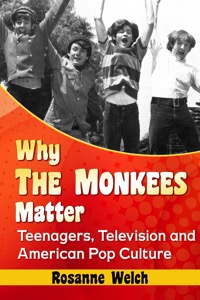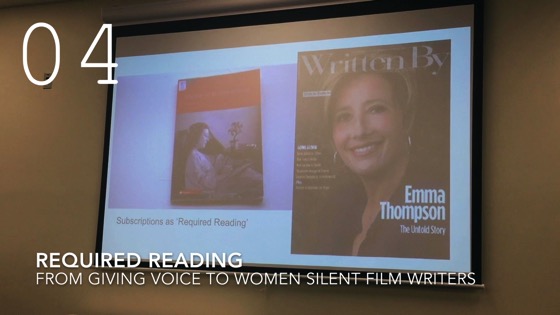Rosanne Welch talks about “Why The Monkees Matter” with Jean Hopkins Power
Watch this entire presentation (45 mins)
Jean Powergirl takes the host reigns and welcomes her guest Rosanne Welch, PhD to the show! They’ll be discussing Roseanne’s book, “Why The Monkees Matter: Teenagers, Television and American Pop Culture.”
Transcript:
Jean: I love talking about this.
Rosanne: Well, and that’s how it applies to The Monkees because they looked for young writers. Treva Silverman was beginning her career.
Jean: Let’s talk about the writers on The Monkees? So, Treva Silverman’s a woman, right? Woman Writer. All right, let’s talk about Treva.
Rosanne: I love Treva. She’s wonderful. You can look at the Academy of Television Arts. They have a good oral interview with her that goes through The Monkees and Mary Tyler Moore. She’s wonderful.
Jean: Ok, so she’s the only female writer on there.
Rosanne: She was. Many of them came from New York because a lot of TV had still being done in New York and they were also kind of younger — quote/unquote — hipper. She came out here and she really loved it. She admitted to me that it was the first time she had ever smoked pot and she found it fabulous. And her friends back home were still a little too
Jean: Go LA!
Rosanne: — exactly. The things you’re going to learn in LA, but the fact is she could come in with a more feminist attitude and make sure that the female characters were not these crazy, silly nonsense women.
Jean: And she was sought after to go after this demographic — this new demographic.
Rosanne: Yes. Yes, definitely
A hit television show about a fictitious rock band, The Monkees (1966-1968) earned two Emmys–Outstanding Comedy Series and Outstanding Directorial Achievement in Comedy. Capitalizing on the show’s success, the actual band formed by the actors, at their peak, sold more albums than The Beatles and The Rolling Stones combined and set the stage for other musical TV characters from The Partridge Family to Hannah Montana. In the late 1980s, the Monkees began a series of reunion tours that continued into their 50th anniversary.
This book tells the story of The Monkees and how the show changed television, introducing a new generation to the fourth-wall-breaking slapstick created by Laurel and Hardy and the Marx Brothers. Its creators contributed to the innovative film and television of 1970s with projects like Bob & Carol & Ted & Alice, The Mary Tyler Moore Show, Laugh-In and Welcome Back, Kotter. Immense profits from the show, its music and its merchandising funded the producers’ move into films such as Head, Easy Rider and Five Easy Pieces.
Rosanne Welch, PhD has written for television (Touched by an Angel, Picket Fences) and print (Three Ring Circus: How Real Couples Balance Marriage, Work and Kids and The Encyclopedia of Women in Aviation and Space). In the documentary world she has written and produced Bill Clinton and the Boys Nation Class of 1963 for ABC NEWS/Nightline and consulted on PBS’s A Prince Among Slaves, the story of a prince from West Africa who was enslaved in the 1780s, freed by order of President John Quincy Adams in the 1820s and returned to his homeland.
Podcast: Play in new window | Download
Subscribe: RSS
![26: Treva Silverman and The Monkees : “Why The Monkees Matter” Interview with Jean Power [Video] (0:58)](https://rosannewelch.com/wp-content/uploads/2017/11/rmw-power-26-treva-silverman.jpeg)










![25: Improv, Writers and The Monkees : “Why The Monkees Matter” Interview with Jean Power [Video] (0:53)](https://rosannewelch.com/wp-content/uploads/2017/11/rmw-power-25-improv.jpeg)




![24: Writers, Actors and The Monkees : “Why The Monkees Matter” Interview with Jean Power [Video] (0:57)](https://rosannewelch.com/wp-content/uploads/2017/10/rmw-power-24-writers-actors.jpeg)
![My Background from Giving Voice to Silent Films and the Far From Silent Women Who Wrote Them with Dr. Rosanne Welch [Video] (0:40)](https://rosannewelch.com/wp-content/uploads/2017/10/ufva-03-background.jpeg)

![23: Writers, Fans and The Monkees : “Why The Monkees Matter” Interview with Jean Power [Video] (1:14)](https://rosannewelch.com/wp-content/uploads/2017/10/rmw-power-23-writers-fans.jpeg)
![Remember the Ladies from Giving Voice to Silent Films and the Far From Silent Women Who Wrote Them with Dr. Rosanne Welch [Video] (0:56)](https://rosannewelch.com/wp-content/uploads/2017/10/ufva-02-remember-ladies.jpeg)